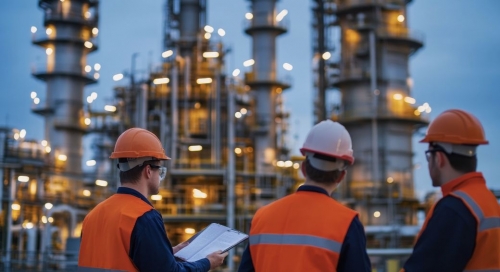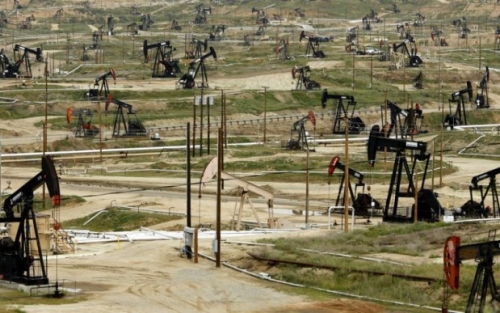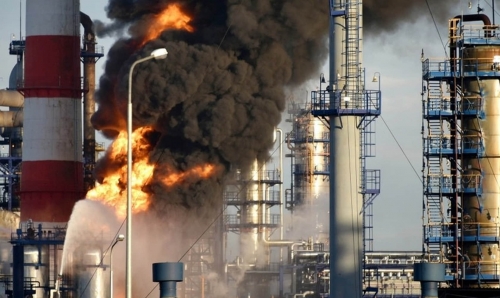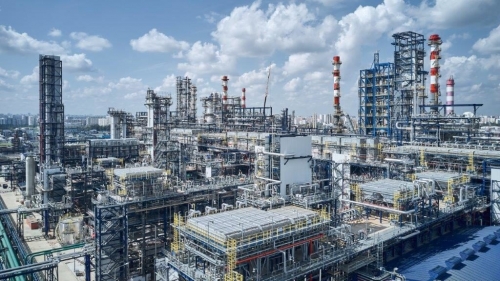A delayed shortlist has been completed for work to improve storage and distribution facilities at the industrial area under development on the eastern coast of Abu Dhabi.
The deal is part of the latest phase of a programme dating back more than a decade by government-owned Abu Dhabi National Oil Co. (ADNOC) to improve the emirate's oil products storage and distribution infrastructure.
Downstream development has accelerated across the UAE over the past 18 months - spurred by the commissioning of a major refinery expansion, fast-growing local fuel demand and an upturn in oil revenues. In Dubai, the second major contract was awarded in early April on the expansion of the government's condensate refinery at the port of Jebel Ali.
Following initiation of the shortlisting process during the first half of last year, Abu Dhabi Oil Refining Co. (Takreer) has prequalified around 10 companies for the engineering, procurement and construction (EPC) contract on the third phase of the so-called Inter-Refinery Pipelines (IRP) project near the port of Khalifa.
Those qualified are understood to include CAT Group and National Petroleum Construction Co. (NPCC), both local, Athens-based Consolidated Contractors Co. (CCC), China Petroleum Engineering & Construction Corp. (CPECC), GS Engineering & Construction and Samsung Engineering, both of South Korea, and Italy's Saipem.
Tebodin of the Netherlands is the project management consultant (PMC), while the UK's Amec Foster Wheeler carried out the front-end engineering and design (FEED) contract.
A tender is expected during the second quarter for the work, which covers a new multi-products terminal - including storage tanks, a jetty, and shiploading and offloading facilities - at the Khalifa Industrial Zone (KIZAD) under development adjacent to Khalifa Port to the east of the long-established industrial zone at Mussafah, near the capital.
The scope also encompasses jet fuel pipelines to Abu Dhabi International Airport and Al-Maktoum International Airport, and an LPG pipeline to Mussafah.
KIZAD was launched in 2010 with a stated aim of becoming the largest industrial city in the region and of contributing 15% of Abu Dhabi's non-oil GDP by 2030.
Takreer's fuel marketing and distribution sister company, ADNOC Distribution, signed a 50-year lease last May for land at the 420-square km site for uses including the establishment of a 545,000 cubic metre storage facility for gasoline, diesel and jet fuel - said to be designed as a back-up to an existing terminal at Mussafah.
ADNOC subsidiary Takreer is the owner and operator of the emirate's two refineries at Ruwais in the Western Region and at Umm al-Nar near Abu Dhabi City.
The first phase of the IRP project, linking the Ruwais refinery to both the 85,000 bpd Umm al-Nar plant and to Mussafah, was completed in 2007 under a contract let to local firm Dodsal.
Phase 2, commissioned in 2014, covered a network of pipelines connecting the refineries to fuel depots across Abu Dhabi and Al-Ain and new storage tanks at Mussafah - carried out under separate EPC contracts with South Korea's GS Engineering & Construction and compatriot Daewoo.
Demand for fuel is rising rapidly across the UAE, while the incentive for the main distributors to increase market share was strengthened in mid-2015 by the government's decision to liberalise fuel prices.
Local supply was roughly doubled in the same year through the delayed commissioning of a US$10 billion expansion of the Ruwais refinery to around 830,000 bpd. Meanwhile, the FEED and technology supply contracts were awarded in December on a project to add a further 4.2 million tpy of gasoline capacity at the plant.
Revised EPC prices were submitted late last year on another scheme aimed at honing the Ruwais facility's configuration to maximise the value added to the emirate's crude. This will modify the newer units to enable the processing of 420,000 bpd of offshore crude, freeing up more valuable onshore grades for export.
ADNOC's Dubai government-owned counterpart Emirates National Oil Co. (ENOC) is likewise embarked on a domestic expansion drive. In early April it awarded an EPC contract to Singapore-based Rotary Engineering to install additional storage facilities at the firm's Jebel Ali condensate refinery as a corollary to the 50% expansion under way of the latter's capacity to 210,000 bpd.
The main EPC package for the expansion, which is due for completion in late 2019, was awarded to France's TechnipFMC last year. Rotary's contract calls for the addition of 12 tanks with total capacity of 450,000 cubic metres of jet fuel, naphtha and gasoline.
ENOC is also positioning itself to take advantage of an increase in traffic through the UAE's burgeoning airports.
A tender is due by the end of the year for a spur pipeline supplying jet fuel to Al-Maktoum International Airport from the Falcon Pipeline, which currently links the Jebel Ali products storage terminal of ENOC subsidiary Horizon Terminals to Dubai International Airport.
UAE state firms improve oil products systems
2017.04.21
1 638

%20(1).png)



